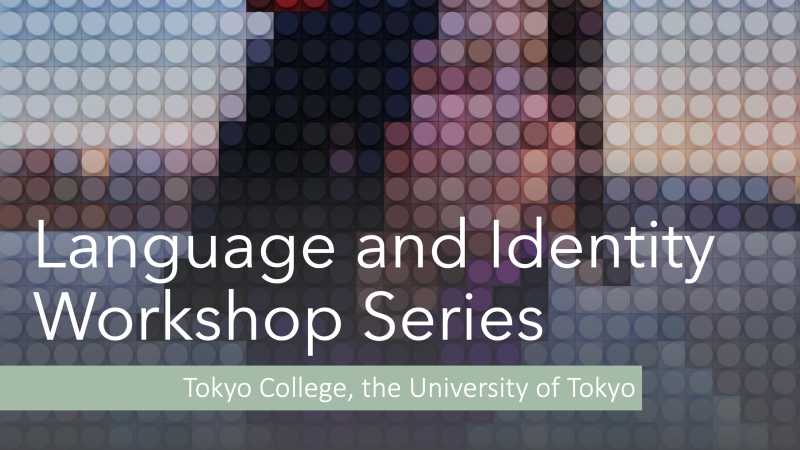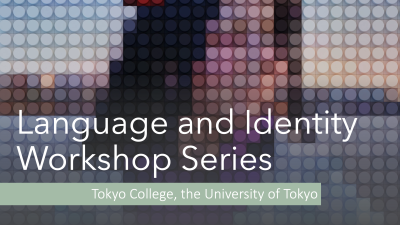Language and Identity Workshop III. Language and Identity in the Classroom: Policy and Education

| Date(s) | Monday, 17 April 2023, 2:30-4:00 PM |
|---|---|
| Venue |
Zoom Meeting (Register) |
| Registration | Pre-registration required |
| Language | English |
| Abstract |
Sara CHAYANI (Ph.D. Student, University of Brighton) Identity construction in Algerian textbooks After the independence of Algeria, an Arabization policy was adopted by the new state to replace French with Arabic in all public domains, starting with education. The Arabization policy did not only aim to replace French, it also banned the use Tamazight in schools (Aitel 2013). Amazighs’ struggle for recognition has been going on for decades in Algeria and North Africa and it was until 2016 that Tamazight was given the official status of a second language in Algeria. Relying on CDA methods, this paper studies the construction of Algerian identity in Arabic, French and English textbooks, currently used in Algerian middle schools. The findings shows that Algeria’s identity is built upon three main pillars Islam, Arabism and colonial legacy. The construction of these identity facets differ between the three languages. In the Arabic dataset, Islamic ideology is omnipresent; it is used as a blueprint for the writing of many texts in this dataset. Apart from religion, the Arabic and French datasets construct Algerian identity in similar ways, focusing on the colonial era and the Arab identity of the country. The representation of Algeria in the English dataset is rather superficial. In this dataset, Algeria appears mainly in touristic contexts constructed for a foreign gaze. Amazigh identity is present in the datasets; however, when looking closely at the discursive construction of this linguocultural group, it appears that this seeming attempt of including Amazigh identity could result in its exclusion from Algeria’s national identity. References:
SONG Zhiwen (Ph.D. Candidate, University of Cincinnati) An autoethnographic study of an Asian, non-mainstream-English-speaking teacher in TESOL: A transnational and raciolinguistic perspective Despite efforts to acknowledge the legitimacy of nonnative English speakers (NNES) in English language education, the unequal treatment of them and the superiority attributed to mainstream-English-speaking (Alim & Smitherman, 2012; Baker-Bell, 2020) teachers from inner circle countries (Kachru, 1985) persist. Conceptualized as a dynamic process rather than as a predetermined product (Alim, Reyes, & Kroskrity, 2020), recently race has been given more visibility in applied linguistics and TESOL scholarship (e.g., Lee & Jang, 2022; Motha et al., 2012; Ramjattan, 2019) to promote anti-racist educational practices. From a raciolinguistic perspective (Rosa & Flores, 2017), this study delineates the racialized experiences of an Asian, non-mainstream-English-speaking teacher who has worked in mainland China, Hong Kong, and the United States. It elucidates the shifts in her conceptualization of race, as well as the (re)construction of her identities and ideologies as an English-language teacher. The study sheds light on how language, race, and other interrelated sociocultural categories are discursively (un)marked in the racializing process and how they shaped teacher identity construction and negotiation. The study concludes with suggestions to promote anti-racism research and to enact socially just practices. References: Alim, H. S., & Smitherman, G. (2012). Articulate while Black: Barack Obama, language, and race in the US. Oxford University Press. Baker-Bell, A. (2020). Linguistic justice: Black language, literacy, identity, and pedagogy. Routledge. Kachru, B.B. (1985) “Standard, Codification and Sociolinguistic Realism: The English Language in the Outer Circle,” in R. Quirk and H. Widdowson (eds) English in the World: Teaching and Learning the Language and Literatures, Cambridge: Cambridge University Press, pp. 11–30. Lee, H., & Jang, G. (2022). “The Darker Your Skin Color is, the Harder it is in Korea”: Discursive Construction of Racial Identity in Teaching Internationally. TESOL Quarterly. Motha, S., Jain, R., & Tecle, T. (2012). Translinguistic identity-as-pedagogy: Implications for language teacher education. International Journal of Innovation in English Language Teaching and Research, 1(1), 13. Ramjattan, V. A. (2019). Racist nativist microaggressions and the professional resistance of racialized English language teachers in Toronto. Race Ethnicity and Education, 22(3), 374-390. Rosa, J., & Flores, N. (2017). Unsettling race and language: Toward a raciolinguistic perspective. Language in society, 46(5), 621-647.
Sujoy SARKAR (Lecturer, Central Institute of Indian Languages) Issue & consequences of mismatched medium of instruction in primary education: A study of Poro Forest Village School The paper describes the issues with the gap between home language and school language and the adverse effects it has on primary school education through a case study of Poro Forest village School. The paper provides a description of language practice in two forest village primary schools in West Bengal, India. The study is based on Poro Forest Village Junior High School and Poro Forest Village Primary School. Classroom observation, participant observation, and interviews with the school alumni and teachers are the method used to describe the language practices in the classroom. Despite having more than ninety per cent of students in the school belong to the Rabha community, one of the minor tribal communities of the region, the Medium of Instruction is Bengali, the state language of West Bengal. The students speak Rabha language, a Tibeto Burman language, at the home domain, and playground. The whole teaching-learning process happens through the Bengali language. In the early stage of primary education, students hardly understand the Bengali language. The teachers in the schools are not equipped with the language spoken by the children. Thus, neither the teachers could build a communication bridge with the students nor the students. Despite the breakdown of the communication, the students are educated in the Bengali language, as their home language(Rabha) does not find any place in the classroom. The classroom observation from the Class V classroom captures how the teacher reads from a book, and students repeat the same. The students did not participate in any active learning. The interviews also express the difficulties of MoI in the classroom. The exclusive language-in-education policy thus became a significant reason for educational disadvantage for the Rabha Children at the early stage of education and deterrent to language maintenance. References: Chaturvedi, M. G., & Mohale, B. V. 1976. Position of Languages in School Curriculum in India. Delhi: NCERT. Jhingaran, D. 2005. Language Disadvantage: The Learning Challenges in Primary Education. New Delhi: APH Publishing Corporation. Kocchar, S. K. 2005. Language Problem Pivotal Issues in Indian Education. Delhi: Sterling Publishers Pvt. Ltd. Mohanty, A. K., Panda, M. et.al. (Eds.). 2009. Social Justice through Multilingual Education. Bristol: Multilingual Matters. National Curriculum Framework. 2005. New Delhi: National Council of Educational Research and Training. Pattanayak, D. P. 1981. Multilingualism and Mother-Tongue Education. New Delhi: Oxford University Press. Philipson, R., & Skutnabb-Kangas, T. (Eds.). (1994). Linguistic Human Rights. New York: Mouton de Gruyter. Report of The Steering Committee on Empowering The Scheduled Tribes for The Tenth Five Year Plan (2002-2007). Government of India Planning Commission. 2001. New Delhi.
Eva VETTER (Professor, University of Vienna) and Stefanie CAJKA (Ph.D. Student, University of Vienna) Language revitalization, educational policies and identity: The case of an autochthonous minority language in Austria Approximately half of the world’s estimated 7,000 languages are considered to be endangered, as they may go out of use and therefore face extinction within a couple of decades. One response to the endangerment of languages are revitalization efforts (Austin & Sallabank 2011). The reasons for language revitalization are manifold, but one of the main motivations is concerned with identity, as claiming and defining identity is a central motive for undertaking these efforts (Grenoble 2021). This presentation explores the topics of language and identity in language revitalization from the perspective of the project ‘RISE UP – Revitalising Languages and Safeguarding Cultural Diversity’. RISE UP pursues a multidisciplinary approach. It aims to empower endangered language communities through the development of digital and non-digital methods, the identification of good practices and the establishment of connections between relevant actors. The project focuses on five different language communities, namely Aranés, Aromanian, Burgenland Croatian, Cornish and Seto. In this contribution, one of these case studies will be discussed in particular: After presenting the project, we approach the question of the reflection of identity in education and language policy with focus on the role of Burgenland Croatian in Austria. With regard to its status as an autochthonous minority language in Austria, the current implementation of educational policies will be presented and critically discussed. References: Grenoble, Lenore A. 2021. Why revitalize? In Justyna Olko & Julia Sallabank (eds.), Revitalizing endangered languages: A practical guide, 9-22. Cambridge; New York: Cambridge University Press.
For information about the keynote lecture for this event, please see this event page. To learn more about the Language and Identity Workshop Series, check out this news article. |
| Program |
14:30-14:50 (15 min. talk + 5 min. Q&A)
14:50-15:10 (15 min. talk + 5 min. Q&A)
15:10-15:30 (15 min. talk + 5 min. Q&A)
15:30-15:50 (15 min. talk + 5 min. Q&A)
15:50-16:00 |
| Speaker Profile |
Presenters Sara CHAYANI
SONG Zhiwen
Sujoy SARKAR
Eva VETTER
Moderator Naoko HOSOKAWA |
| Organized by | Tokyo College, The University of Tokyo |
















